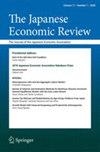GDP是相关的社会福利指标吗?储蓄者-消费者理论方法
IF 0.5
4区 经济学
Q2 ECONOMICS
引用次数: 0
摘要
使用GDP作为一个国家进步和福利的主要指标一直是经济学家长期争论的主题。本文运用并扩展了储蓄者-消费者理论,分析了GDP与社会福利之间的理论关系。这种分析是使用几个不同的重叠代模型进行的,这些模型都考虑到数据中观察到的消费者行为的巨大异质性(不同的劳动力供应选择,不同程度的利他主义和/或不同程度的消费不耐烦)。结果表明,国内生产总值(人均)往往是一个相关的指标,总是一个体面的社会福利指标。本文章由计算机程序翻译,如有差异,请以英文原文为准。
Is GDP a Relevant Social Welfare Indicator? A Savers–Spenders Theory Approach
The use of GDP as the main index of progress and welfare of a country has been the subject of a long debate among economists. Using and extending the savers–spenders theory, we analyse the theoretical relationship between GDP and the welfare of a society. This analysis is undertaken using several different overlapping generations models which all take into account the great heterogeneity of consumer behaviour observed in the data (different labour supply choices, different degrees of altruism and/or different degrees of impatience to consume). The results indicate that GDP (per capita) is often a relevant index and is always a decent social welfare indicator.
求助全文
通过发布文献求助,成功后即可免费获取论文全文。
去求助
来源期刊

Japanese Economic Review
ECONOMICS-
CiteScore
2.70
自引率
0.00%
发文量
15
期刊介绍:
Started in 1950 by a group of leading Japanese economists under the title The Economic Studies Quarterly, the journal became the official publication of the Japanese Economic Association in 1959. As its successor, The Japanese Economic Review has become the Japanese counterpart of The American Economic Review, publishing substantial economic analysis of the highest quality across the whole field of economics from researchers both within and outside Japan. It also welcomes innovative and thought-provoking contributions with strong relevance to real economic issues, whether political, theoretical or policy-oriented.
 求助内容:
求助内容: 应助结果提醒方式:
应助结果提醒方式:


